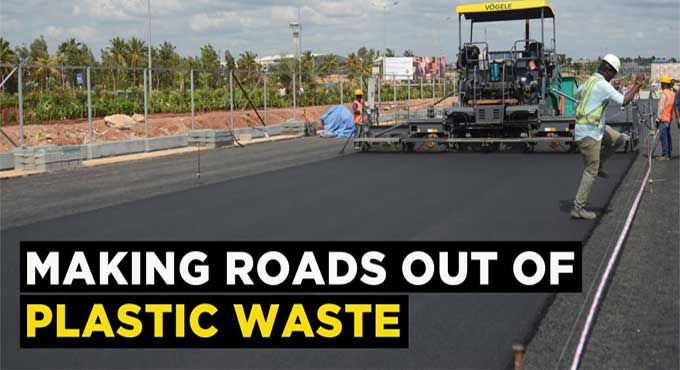
Revolutionizing Infrastructure: Plastic Roads - The Road to a Sustainable Future
As our world grapples with mounting plastic waste and deteriorating road infrastructure, an innovative solution has emerged - plastic roads. These roads are constructed using recycled plastic waste, offering a promising means of addressing two pressing issues simultaneously.
What Are Plastic Roads?
Defining Plastic Roads
Plastic roads, also known as polymer roads or plastic-infused roads, are a novel approach to road construction that incorporates waste plastics as a significant component in the asphalt mix. Essentially, these roads utilize plastics as a binding agent in the construction process.
Components of Plastic Roads
The plastic waste is first collected, cleaned, and processed into small pieces or pellets. These plastics are then added to the asphalt mix, where they act as a binding agent. The final mixture is used in the road construction process to create a durable and sustainable road surface.
How to Make Plastic Roads
The Production Process
Collection and Sorting: Plastic waste is collected and sorted to ensure that it meets the required quality standards. This includes removing non-recyclable or non-compatible plastics from the mix.
- Shredding and Processing: The sorted plastic is then shredded and processed into smaller pieces or pellets. This makes it easier to blend with the asphalt.
- Mixing with Asphalt: The processed plastic is introduced into the asphalt mix, typically replacing a portion of the bitumen, the traditional binding agent. The mixture is thoroughly blended to ensure even distribution.
- Road Construction: The plastic-infused asphalt is used in road construction like conventional asphalt. It is laid down, compacted, and treated to create a smooth and durable road surface.
Who Invented Plastic Roads?
The Pioneer: Dr. R. Vasudevan
The pioneer behind the concept of plastic roads is Dr. R. Vasudevan, a professor of chemistry in India. Dr. Vasudevan's groundbreaking work dates back to 2001 when he first introduced the idea of using waste plastics to improve road construction. His innovative approach not only addresses plastic waste management but also enhances the quality and durability of roads.
The First Man-Made Plastic Road
The first-ever man-made plastic road was constructed in Chennai, India, in 2002. This historic milestone was the result of Dr. R. Vasudevan's innovative research and efforts. The success of this project laid the foundation for the development of plastic roads worldwide.
Advantages of Plastic Roads
1. Waste Plastic Utilization
One of the most significant advantages of plastic roads is their ability to repurpose and recycle plastic waste, reducing the environmental impact of plastic pollution.
2. Enhanced Durability
Plastic roads are known to be more durable than traditional asphalt roads. The plastic component in the mix improves road strength and resistance to wear and tear.
3. Reduced Maintenance
These roads require less maintenance over their lifespan, resulting in cost savings for local authorities and governments. They are less prone to cracks and potholes.
4. Eco-Friendly
Plastic roads are an environmentally friendly solution. They reduce the consumption of bitumen, a petroleum-based product, which decreases the carbon footprint of road construction.
5. Improved Road Quality
Roads constructed with plastic have demonstrated better resistance to water damage and improved flexibility. This can be especially advantageous in areas with extreme weather conditions.
Disadvantages of Plastic Roads
1. Initial Costs
The initial setup costs for the machinery and technology needed to produce plastic roads can be relatively high. There may, however, be a long-term saving to offset these costs.
2. Limited Compatibility
Not all types of plastics can be used in road construction. Compatibility issues can arise, requiring careful selection and processing of suitable plastics.
3. Quality Control
Maintaining the quality and consistency of plastic-infused asphalt mixtures is essential for ensuring road durability. Strict quality control measures are necessary.
4. Perception and Skepticism
The concept of plastic roads is still relatively new, and skepticism exists regarding their long-term performance and sustainability.
Plastic Roads around the World
India: Leading the Way
India has been at the forefront of implementing plastic roads on a large scale. Several states have embraced this technology as a sustainable solution to their infrastructure needs.
The Netherlands: Innovating Sustainability
The Netherlands has also made strides in plastic road innovation. They've experimented with the use of recycled plastics in road construction and continue to explore its potential.
The United States: A Slow but Growing Trend
In the United States, the concept of plastic roads is slowly gaining traction. Pilot projects have been launched in various states to evaluate the feasibility and benefits of plastic road technology.
Future Prospects of Plastic Roads
As the world confronts the dual challenges of plastic pollution and the need for sustainable infrastructure, plastic roads offer a promising solution. The ongoing research and development in this field, coupled with success stories from early adopters, indicate a bright future for plastic roads.
As technology advances and awareness of their benefits spreads, plastic roads have the potential to become a standard in road construction, making our planet greener while improving the quality and longevity of our roadways.
Conclusion
The advent of plastic roads marks a significant milestone in addressing two of the most pressing global challenges: plastic pollution and the need for durable, sustainable infrastructure. Dr. R. Vasudevan's pioneering work has led to innovative road construction methods that reduce plastic waste, improve road quality, and offer long-term cost savings.
As the world embraces this eco-friendly and efficient approach to road building, we can look forward to a greener, more sustainable future for our infrastructure. Plastic roads are not just a concept; they are a real, tangible solution that paves the way for a cleaner and more resilient world.
To get more details, watch the following video tutorial.
Video Source: Startup Selfie


